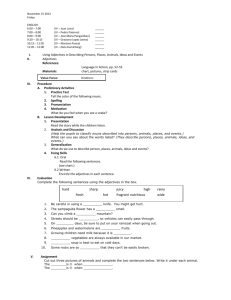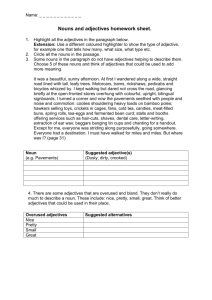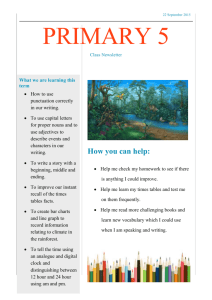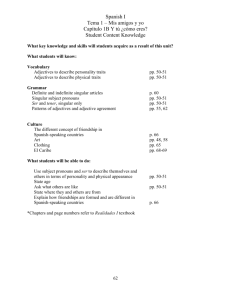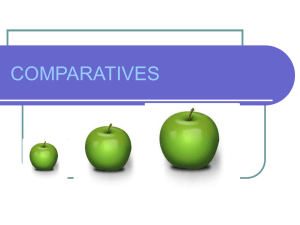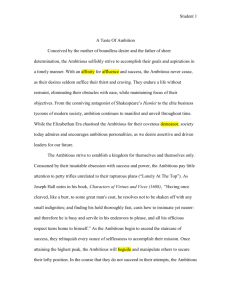words
advertisement
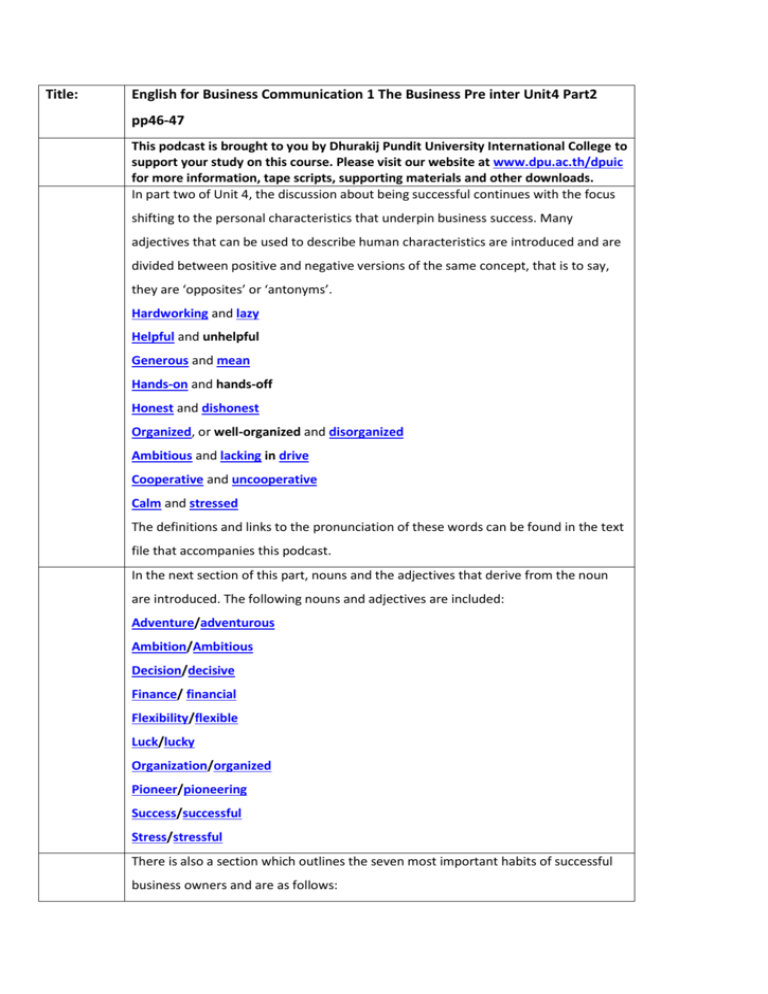
Title: English for Business Communication 1 The Business Pre inter Unit4 Part2 pp46-47 This podcast is brought to you by Dhurakij Pundit University International College to support your study on this course. Please visit our website at www.dpu.ac.th/dpuic for more information, tape scripts, supporting materials and other downloads. In part two of Unit 4, the discussion about being successful continues with the focus shifting to the personal characteristics that underpin business success. Many adjectives that can be used to describe human characteristics are introduced and are divided between positive and negative versions of the same concept, that is to say, they are ‘opposites’ or ‘antonyms’. Hardworking and lazy Helpful and unhelpful Generous and mean Hands-on and hands-off Honest and dishonest Organized, or well-organized and disorganized Ambitious and lacking in drive Cooperative and uncooperative Calm and stressed The definitions and links to the pronunciation of these words can be found in the text file that accompanies this podcast. In the next section of this part, nouns and the adjectives that derive from the noun are introduced. The following nouns and adjectives are included: Adventure/adventurous Ambition/Ambitious Decision/decisive Finance/ financial Flexibility/flexible Luck/lucky Organization/organized Pioneer/pioneering Success/successful Stress/stressful There is also a section which outlines the seven most important habits of successful business owners and are as follows: Firstly, Successful entrepreneurs are good role models, that is to say, they are a good example of good behavior and hard work for their employees. Secondly, good business owners invest both time and money in their business and the training of their team. Thirdly, a good entrepreneur knows how to manage their time and their work effectively. Fourthly, good business owners should be fit and healthy. Fifthly, good business people should be pioneering, that is to say, they have lots of new and interesting ideas. Sixthly, a good businessperson should look after their clients. And seventhly, a good entrepreneur should be able to make decisions and take action where necessary. Look at the links posted on the DPUIC website for more learning websites and downloads. Keep practicing! Discussion questions Which of the seven habits do you think is the most important for a successful business? What are two more habits of successful business owners? What sort of worker/student are you? How would your colleagues describe you? Links to other resources Personality adjectives http://www.esolcourses.com/content/exercises/grammar/adjectives/personality/more-words-fordescribing-personality.html http://www.englishclub.com/vocabulary/adjectives-personality-positive.htm http://www.englishclub.com/vocabulary/adjectives-personality-negative.htm http://www.examples-help.org.uk/parts-of-speech/personality-adjectives.htm http://www.cytss.edu.hk/cyt-7pyl/car/Testimonial%20Reference.pdf Vocabulary and useful phrases Hardworking and lazy : a lot of effort/ a lack of effort Helpful and unhelpful: assists others/doesn’t assist others Generous and mean: Gives things to others or spends a lot of money on others/ doesn’t give things to others or spend a lot of money on others Hands-on and hands-off: involves him/herself in the business in an active and practical way/ doesn’t involve him/herself in an active or practical way Honest and dishonest: can be trusted/cannot be trusted Organized, or well-organized and disorganized: is able to plan and carry out functions efficiently/ is unable to plan or carry out functions in an efficient way. Ambitious and lacking in drive: has a strong desire to succeed/ doesn’t have a strong desire to succeed. Cooperative and uncooperative: is willing to help others/ is unwilling to help others Calm and stressed: relaxed/ constantly worried and under pressure Adventure: a trip into the unknown Adventurous: someone who is not scared to take a trip into the unknown Ambition: the desire to succeed Ambitious: having the desire to succeed Decision: the choice between various options which leads to a future course of action Decisive: the ability to make a good decision when faced with different options. Finance: money or investment Financial: related to money matters Flexibility: the ability to adapt to different situations or events Flexible: the ability to adapt to different situations or events Luck: good fortune lucky; having good fortune Organization: a large-scale company or business Organized: efficient and well-planned Pioneer: someone with innovative ideas Pioneering: implementing new ideas by putting them into practice Success: the achievement of one’s goals Successful: having achieved one’s goals Stress: the pressure one feels when the demands of work seem, or are, too great. Stressful: a description of a situation or event that puts someone under pressure.
